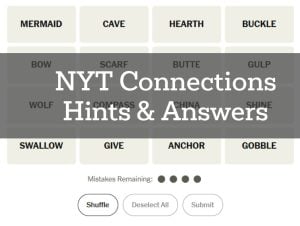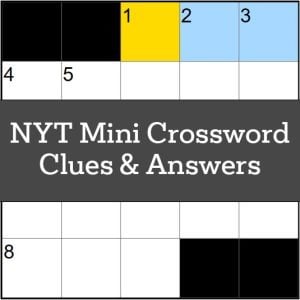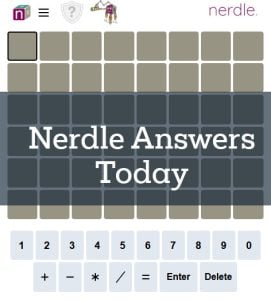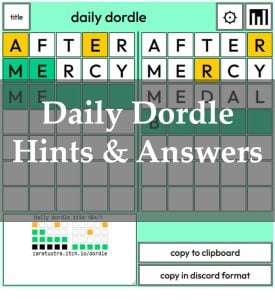Looking for the answers and hints for the Quordle puzzle from July 28, 2025? You’ve come to the right place! Every day, we archive the solutions to help you check your work or get that final clue you need. Below you will find all the answers for yesterday’s Quordle challenge.
Quordle Hints for July 28, 2025
Here are all the official hints to guide you toward the solution.
Word 1 Hints:- The word follows the consonant-vowel-consonant-vowel-consonant pattern.
- This is a noun commonly used to refer to something sweet.
- It belongs to the category of confections often enjoyed by children.
- These are often given out during celebrations or as a reward for good behavior.
- You might find this in a jar at a grandmother's house, or being tossed from floats during a parade.
- The word has a consonant-vowel-consonant-consonant-vowel structure, with the vowels being the same.
- This term is a noun and often carries a romantic or secret connotation.
- It falls under the category of interpersonal relationships and clandestine meetings.
- You might use this word to describe a pre-arranged, often secretive meeting between individuals, typically carrying a connotation of intimacy.
- Think of a context where two people may plan a discreet rendezvous, often associated with whispers and confidentiality.
- The first letter is a consonant, followed by a vowel, and then three more consonants, with one of them repeating.
- This word is a noun and names a common item of clothing.
- This item falls under the category of apparel, typically worn on the upper half of the body.
- You would typically put this on after taking a shower or while getting ready for a casual or smart-casual event.
- This piece of attire could have long or short sleeves and often comes with a collar and buttons at the front.
- The word has two vowels, both are the same, in the middle of the consonants which are all distinct from each other. The pattern is consonant-vowel-vowel-consonant-consonant.
- This word is a verb that describes an action one might decide to take regarding desires or actions.
- It is commonly used when discussing self-restraint or abstaining from something.
- You might do this to certain activities or indulgences typically for a greater purpose, personal benefit, or self-discipline.
- To solve this puzzle, think of what you might willingly choose not to do or have, despite having the opportunity to do so.
Spoiler Warning!
The final answers are below. Stop scrolling now if you want to solve it yourself!
Quordle Answer for July 28, 2025
Here is the final, official answer for the Quordle puzzle that was released on July 28, 2025.
CANDY, a noun, refers to a sweet confection that is typically made from sugar and often combined with chocolate, fruit, or nuts. In everyday language, the term is used to describe anything from hard sweets to chewy treats. Examples include phrases like "candy shop" or "I have a candy craving." The word "candy" stems from the ancient Sanskrit word 'khanda,' implying a piece of sugar, eventually passing through Arabic as 'qandi,' signifying something made with sugar. The word might challenge Quordle players due to its association with specific regional treats, potentially leading to variations in spelling.
Word #2: TRYSTTRYST is a noun that denotes a private, prearranged meeting between lovers. A common way to use this word is in a sentence like "The lovers arranged a tryst under the stars." The origin of TRYST can be traced back to the old French term 'triste', which was a wait or appointed station in hunting, and it shifted in English to mean an appointed meeting, especially between lovers, further romanticizing the term. Players may find this word tricky due to its less common use in modern language and potential confusion with similarly spelled words.
Word #3: SHIRTSHIRT, a noun, refers to a cloth garment for the upper body, typically with sleeves and a collar. When discussed, it often appears in contexts like "He put on his favorite shirt for the interview." The word has Old English roots, coming from "scyrte", meaning a short garment. Historically, the term "shirt" has been used for various types of upper body garments across different cultures. This word may present a challenge in Quordle due to the similarity in the spelling of numerous clothing-related items, potentially causing confusion.
Word #4: FORGOThe verb FORGO means to do without or abstain from. It is frequently used in manners such as "She decided to forgo dessert for a month." The word has ties to the Old English "forgān", meaning to pass by, and it has maintained a similar meaning over the years. The concept of going without something is often affiliated with this word. What might stump players in finding FORGO could be its less conventional spelling with "go" at the end, as opposed to more frequently encountered word endings like "gone" or "going".
Read More Daily Game Answers
Check out the answers and hints for our other popular daily word games and puzzles.






